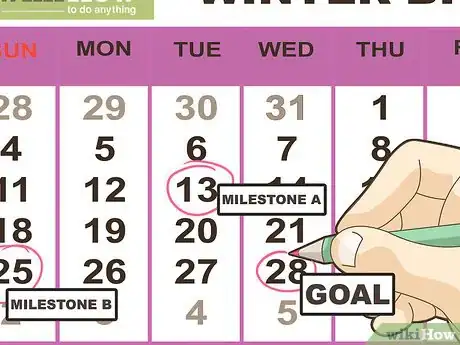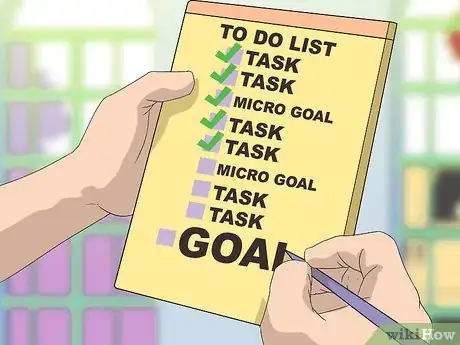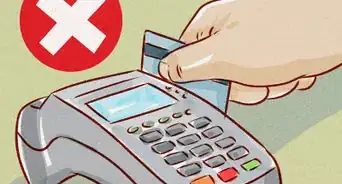This article was co-authored by Jennifer Butler, MSW. Jennifer Butler is a Love & Transformation Coach and the Owner of JennJoyCoaching, a life coaching business based in Miami, Florida, although Jennifer works with clients all over the world. Jennifer’s work centers around empowering women who are navigating any stage of the divorce or breakup process. She has over four years of life coaching experience. She is also the co-host of the Deep Chats Podcast along with Leah Morris and the host of season 2 “Divorce and Other Things You Can Handle” by Worthy. Her work has been featured in ESME, DivorceForce, and Divorced Girl Smiling. She received her Masters of Social Work (MSW) from New York University. She is also a Certified Health Coach, a Communications & Life Mastery Specialist, and a Certified Conscious Uncoupling and Calling in “the One” coach.
There are 14 references cited in this article, which can be found at the bottom of the page.
This article has been viewed 51,136 times.
The idea of being accountable can seem pretty daunting, especially because it can apply to every area of your life in different ways. Being accountable doesn’t mean the same thing in every situation, but there are some basics that you can begin practicing to get better at being accountable. You can learn to be accountable at work, with your money, with goals and with commitments through steps such as being honest, making a budget, setting SMART goals, and keeping promises.
Steps
Being Accountable at Work
-
1Seek feedback from your boss. A great way to begin building accountability at work is seeking feedback from the people you work with. Depending on what your job entails, specifically regarding your position in a hierarchy, you can seek feedback from those above you, those on your level, and those under you.[1]
- Your job may already have specific performance standards in place which are reviewed periodically by supervisors, but you can show your boss that accountability is important to you by actively seeking extra feedback about your performance. You might seek feedback regarding a specific project or assignment you recently finished, or you might want get a general idea for how you are doing.
- Show initiative by asking people in leadership positions questions about what they do and ways you can help them. This builds trust and rapport.[2]
-
2Ask your peers how you are doing. It’s also good to seek feedback from the people you work with day to day, even when they have no power or authority over you. You need to know whether the people you work with can count on you or not.
- Be sure to ask questions that are specific to get the feedback you desire. For example, you might say something like, "I worked really hard on that presentation, but I'd love some feedback on where I could improve. Do you have any input?"
Advertisement -
3Ask your subordinates how you can improve. As a manager, or any upper level position, you don’t want to make all the decisions on your own and never ask how people feel you are leading. Approach subordinates in the right way so you don’t seem like you lack authority. Just be genuine and tell those below you that you want to know how they think you are doing at your job.
- Try creating an anonymous survey that you can distribute to your employees. This may provide you with more honest feedback because they will be less likely to worry about the comments they make backfiring on them.
-
4Implement the feedback you receive. Asking your boss, peers, and subordinates for feedback on your performance is useless if you don’t take the feedback into consideration and find ways to implement it. Maybe you can’t do exactly what the critique entails, but you can use it as a springboard for making changes.
- Make sure that you do not take the feedback personally. Look at it as an opportunity to improve.
- One way to make implementing feedback less intimidating is to gamify it. For instance, you can write down your goal and then track how long it takes you to do your task, like enter data in a spreadsheet. Then, you can try to beat that time the next time.[3]
-
5Be honest about the results of your work. You may spend a lot of time working with a team, and the results are the culmination of everyone’s effort. In some settings, it may be possible to hide or be a little dishonest about the work you accomplished. Being accountable means fully owning up to whatever comes of your work.[4]
- This is hardest when you have made a mistake or have not quite made the best of an opportunity you have been given. It may feel natural to shift the blame or make excuses that focus on outside forces, but being upfront and honest about your work is an important aspect of accountability.[5] Owning up to shortcomings will show the people you work with and for that you are not trying to hide anything.
- When you do mess up, and you have to be honest with someone about the mistake, it is always good to have an idea or plan for how to remedy the situation. Being honest and owning the mistake is the first step, but there is most likely still something that needs to happen. Having a solution to the problem ready when you admit the mistake will help ease the tension and show that you are not giving up.
- Think of it this way—you're powerless when you blame somebody or something for a problem. When you take responsibility, you become empowered rather than being the victim of those circumstances.[6]
-
6Make time for solo work. If you work in an office and you usually have your door open, try shutting it for a couple days. An open door invites people to stop and talk, even if it isn’t about work. Closing the door more often will give you the privacy to focus more on work and less on interacting with people.[7]
- Be sure to avoid digital distractions during this time as well. Log out of your social media accounts and shut off your phone.
-
7Prioritize your tasks. In a given day of work, you might have five or more things that need to get done. However, not all of the tasks have the same level of priority. Get in the practice of working on the most important things first and putting off the things that can wait.[8]
-
8Set specific time limits. For less important tasks, force yourself to limit how long you spend on them. Don’t spend a whole hour clearing out spam email if someone is waiting for an email response from you. Knock out an important task that you know will take a while, and then balance it with a short, lower priority task. Alternating in this way can boost your efficiency.
-
9Keep a time log of how you spend each day for a week. At the end of the day, or periodically throughout the day, write down what you do and how long you spend doing it. You may be surprised where your time actually goes. It’s probably best not to show your boss this log, but it will help you see what is draining your time and you can work on reducing those time-wasters.[9]
Managing Money Responsibly
-
1Make a complete list current spending. The first step to money accountability is just taking stock of what your expenses are. The list needs to include not just definite expenses like bills, but also extras that you consistently spend money on. If you know that eating fast food for lunch is a frequent practice, write it down. Maybe you have a pet that you spend consistent money on, write it down.
-
2Make a budget. The point of a budget is to work for you by designating where your money will go. Some people see this as restrictive, but at its best it takes the pressure off you because you have a plan for what money goes where. Rather than being optimistic that you will stop spending on certain things, include them in the budget so you will be prepared for them.
-
3Calculate your income. To complete a budget to the fullest extent, start out by figuring out your income, which you could do based on weekly, bi-weekly, monthly, and maybe even yearly income. It sort of depends on how often you get paid. Making a precise accounting of your income is essential to making a budget that will work.
-
4List your expenses thoroughly. In regards to expenses, don’t go totally overboard, but try to list anything you can think of that you consistently have to spend money on. This would most likely include, but not be limited to: rent/mortgage, car payment, groceries, utilities (water, electric, gas, internet, cable), gas for the car, car/health/home insurance, student loans. Depending on your situation, you may not have some of these, but you could also have many other ones.
-
5Allocate your entire income. If you have all of your expenses covered in the budget--all of the things you absolutely have to pay for--and you still have money left over, consider whether you want to spend this money, give it to charity, put it into a specific savings account you won’t touch, or perhaps find a way to invest it. Whatever you do with the leftover, find a way to designate the entire income.
-
6Track your expenses. This practice acts as a double check to the budget you have in place. The budget tells you, “this is what you are allowed to spend,” while tracking it completes the cycle and says, “this is what you spent.” In general, making a budget is a one time--or rare occasion--event, but keeping track of what you spend is a day to day habit you have to work at.[10]
- Figure out what the best method will be for you to keep track. You can go with the simple method of having a notebook that is designated as a spending log. Keep it with you all the time and write down each time you spend money. Or, if you can remember, wait until the end of the day to write the accumulated expenditures of the day. Keeping your receipts for each purchase could be a good idea.
- If the notebook method doesn’t work, maybe you are more tech oriented and you can keep a spreadsheet on your computer, or a detailed note on your phone or tablet. This could be a good option for the added benefit of calculation features that spreadsheet software offers.
- Consider signing up for a money management service like Mint, Good Budget, or Money Manager.
-
7Pay off credit card bills immediately. Credit cards can be a great convenience, especially if you have an income is that is inconsistent, but they can also lead to serious financial problems. Despite what you might think, as evidenced by many people’s habits, credit cards are meant to be a temporary payment option that you then repay. Racking up expenses on credit cards and paying the minimum each month is only going to increase your debt.[11]
- If you are already in credit card debt, it is probably best to seek further financial counseling, but if you don’t yet have credit cards, or just recently got one, you can start responsible practices right now.
- Think of a credit card in terms of accountability: the credit card company bought something on your behalf with the express agreement that you would pay them back promptly. Paying them back a little at a time, or defaulting on payments completely, is not showing good accountability on your part.
-
8Use the credit card only when you absolutely have to. Don’t buy a $2000 TV on credit if you know your income can’t handle paying that off quickly. Credit cards are not good when they allow you to live beyond your means momentarily, because then you end up in financial trouble with a hard road out of it.
-
9Pay the entire bill. Before you make a purchase, have a plan for where the money is going to come from to pay the debt. When the bill comes, pay the whole month’s worth of expenses off rather than allowing some of what’s due to roll over. Anything you don’t pay off immediately is going to amount to you paying more than you spent.
Setting Goals and Sticking to Them
-
1Establish a personal mission statement. A great way to begin working on your personal accountability is to think about what your mission in life is.[12] You could make one overall mission statement, or a few separate ones, each focusing on one area of your life. The point of a mission statement is to clearly define what you see as your purpose and also define what ways you plan to follow and achieve that purpose.[13]
- Maybe you have not spent much time considering what your life’s purpose is, but this is an important piece of goal setting and goal fulfillment. Without a specific overall goal for your life, smaller goals may end up being inconsequential.
- Once you have considered your purpose and written out a succinct but thorough mission statement, you can begin to make decisions based on it. Keep it somewhere you will remember and refer to it once a week or more to keep fresh in your mind what you have committed to.
-
2Set SMART goals. SMART goals have long been a practice in the business and personal growth sectors, and using this technique can make a significant impact in keeping yourself accountable to the goals you set. SMART is an acronym whose letters stand for: Specific, Measurable, Attainable, Realistic, and Time-bound. It’s worth noting that the “R” is sometimes called “Relevant” or “Results-oriented.” Write these goals and refer back to them frequently to keep yourself accountable to reaching them.
- Make sure to reevaluate the goals you set occasionally as well.
-
3Make your goals specific. This means making them detailed and avoiding vague ideas. For example, you might set the goal to become a published author, but this is a pretty general goal. A more specific goal would be to get an article of satire published in the New Yorker magazine. Specific goals keep you accountable by not settling for less than what the goal intended.
-
4Set goals that are measurable. This means having criteria that will determine if the goal was met. It should add concreteness to the goal. Sticking with the author example, you could add to the goal what number of articles you want to publish. Is it just one, or is your goal higher? Getting the first one done would be a measurable milestone which shows you are working toward your goal.
- Set goals that are based on specific actions rather than emotions. Focus on what you want to accomplish rather than what you want to feel.
-
5Consider whether your goals are attainable. This means taking stock of what will be necessary to meet the goal. This is the time to consider financial, time, and energy costs that the goal will require. To publish an article, you might need to spend many hours across many weeks researching, writing and editing. You might need to spend money to mail the manuscript. You might need to stay up late nights and lose some sleep. So the “attainable” aspect of the goal counts the cost to meet the goal.
-
6Check to see if your goals are realistic. This means taking an honest look at yourself and your situation. You will need both motivation and ability to achieve any goal you set. Take stock of how hard you are willing to work and what level of ability you have as it pertains to a certain goal. If you consistently slacked off in English class and your friends are constantly correcting your grammar, writing for the New Yorker may not be realistic for you. However, almost any goal can be made realistic if the motivation to achieve it is high enough.
- Taking a 10-minute walk each day would be considered a realistic goal, while expecting yourself to walk for an entire hour would be unrealistic.
- You can always increase your goal after you reach your initial one. For instance, after taking a daily 10-minute walk for 2 weeks, you could increase your total daily walking time to 20 minutes.[14]
-
7Make your goals time-bound. This means having a definite time range in mind in which to meet the goal. Goals that could drag on inevitably into the future are likely to be consistently put off in service of other priorities. Deciding on the time aspect of the goal should be relatively easy and will often be determined by forces outside your control. Setting the goal of getting published within a year helps you prioritize that goal around other things.
-
8Create to do lists. In the service of following your mission statement and setting SMART goals, you will need to have smaller sets of tasks necessary to achieve those larger goals. You can write up to do lists on a daily basis that will help direct the time you spend each day, and you can write up to do lists that are more ongoing and could span a week, month or the whole year.
- Make long-term to do lists and prioritize which things need to be done first, second, and so on. For to do lists that you know will last a while, try to think about doing one or two of the tasks each day until they are all accomplished.
-
9Cross off every task on your to do list. Leaving things unfinished can begin to create a feeling of stress because you have things looming over you that are not done. Finishing one task at a time will help you see that you are accountable to the lists that you make for yourself.
-
10Create micro-goals. For every big life goal you set, there are 5, 10 or 20 small steps that have to be taken to achieve that goal. Therefore, micro-goals are the individual steps that are necessary. They are not only goals that will happen a little while down the road, they are goals that you will diligently begin to achieve ASAP.[15]
- For example, if you want to lose 50 pounds in one year’s time, the steps will include exercising more, eating less, and establishing an overall routine. A micro-goal could be, “Today I will not eat junk food and I will walk one mile.” Micro-goals are baby steps that become the foundation for larger, ultimate goals.
Honoring Your Commitments
-
1Keep promises you make.[16] Everyone has experienced a broken promise, at some point in their life, and knows how serious the repercussions can be. Seeing promises as a sacred responsibility can add the weight to them that’s necessary to help you keep them. If you see a promise as something truly important, then you will do whatever is in your power to keep it.[17]
- It can also be really important to give proper time to considering whether or not you should make a promise in the first place. Think about what it will take to fulfill a promise and honestly assess whether or not you can keep it. It is way easier to refrain from making a promise to someone than it is to explain why you didn’t keep it.
- When you do break a promise, being accountable means confessing to your lapse and sincerely saying you are sorry. In many cases, this will not take away the consequences of the broken promise, but accepting those consequences is better than avoiding them.
- You have to really step-out of the victim mentality. You are the sole responsible for what you do and for the decisions you make. There's no one else to blame. So, be accountable for your role.[18]
-
2Negotiate towards an agreement. If someone asks something of you that you are doubtful that you can deliver on, you can either say yes and hope you make it work, or you can say no. Saying no can be a good option if you couple it with a counter-offer. Rather than accepting terms that you may end up failing to meet, find a way to compromise that gives you a better chance of success.[19]
- Sometimes you may disappoint people by not being able to agree to exactly what they ask of you, but the small disappointment will most likely be outweighed by you fulfilling the agreement. If you agree to something and then fail to deliver, more than disappointment, the other person will probably experience anger at you.
- If you try to negotiate something that you feel confident you can achieve, and the person is unwilling to compromise on their original preference, you should say no if this is at all an option. Tell the person you do not feel you can deliver what they are asking and that you would rather say no than agree to it and end up failing.
-
3Get it in writing. A great way to practice being accountable is making up a detailed written agreement when you are making commitments to someone. This may be excessive in some cases, but if you do it even when it’s unnecessary it will help create the habit of following through. Writing out what you are committing to helps promote accountability because it makes it so you can remember the specifics of what you agree to. It’s hard to honor a commitment if you forget that you made it.[20]
- The specific situation you are in will dictate how detailed of a written agreement you should make. Jotting a brief note to yourself may be enough, but the situation may also warrant a thoroughly detailed contract between you and someone else. You may both want to sign and date it for any potential legal consequences of the agreement.
- At the very least, writing down your commitments will help you remember, and at the most it could serve as evidence for the future.
Expert Q&A
-
QuestionWhat does it mean for someone to be accountable?
 Trudi Griffin, LPC, MSTrudi Griffin is a Licensed Professional Counselor in Wisconsin specializing in Addictions and Mental Health. She provides therapy to people who struggle with addictions, mental health, and trauma in community health settings and private practice. She received her MS in Clinical Mental Health Counseling from Marquette University in 2011.
Trudi Griffin, LPC, MSTrudi Griffin is a Licensed Professional Counselor in Wisconsin specializing in Addictions and Mental Health. She provides therapy to people who struggle with addictions, mental health, and trauma in community health settings and private practice. She received her MS in Clinical Mental Health Counseling from Marquette University in 2011.
Professional Counselor Accountability means taking responsibility for one’s actions. For example, an accountable person admits when they make a mistake and does what they need to make things right.
Accountability means taking responsibility for one’s actions. For example, an accountable person admits when they make a mistake and does what they need to make things right. -
QuestionWhy it is important to be accountable?
 Trudi Griffin, LPC, MSTrudi Griffin is a Licensed Professional Counselor in Wisconsin specializing in Addictions and Mental Health. She provides therapy to people who struggle with addictions, mental health, and trauma in community health settings and private practice. She received her MS in Clinical Mental Health Counseling from Marquette University in 2011.
Trudi Griffin, LPC, MSTrudi Griffin is a Licensed Professional Counselor in Wisconsin specializing in Addictions and Mental Health. She provides therapy to people who struggle with addictions, mental health, and trauma in community health settings and private practice. She received her MS in Clinical Mental Health Counseling from Marquette University in 2011.
Professional Counselor A person’s accountability shows whether that person is honest, trustworthy, reliable, and honorable.
A person’s accountability shows whether that person is honest, trustworthy, reliable, and honorable. -
QuestionWhat does it mean to hold oneself accountable?
 Trudi Griffin, LPC, MSTrudi Griffin is a Licensed Professional Counselor in Wisconsin specializing in Addictions and Mental Health. She provides therapy to people who struggle with addictions, mental health, and trauma in community health settings and private practice. She received her MS in Clinical Mental Health Counseling from Marquette University in 2011.
Trudi Griffin, LPC, MSTrudi Griffin is a Licensed Professional Counselor in Wisconsin specializing in Addictions and Mental Health. She provides therapy to people who struggle with addictions, mental health, and trauma in community health settings and private practice. She received her MS in Clinical Mental Health Counseling from Marquette University in 2011.
Professional Counselor It means that evens when no one is watching, you fulfill obligations. For example, paying bills on time, doing schoolwork on time, showing up for appointments on time all demonstrate self-accountability.
It means that evens when no one is watching, you fulfill obligations. For example, paying bills on time, doing schoolwork on time, showing up for appointments on time all demonstrate self-accountability.
Warnings
References
- ↑ http://www.moneyunder30.com/manage-yourself-10-ways-to-make-yourself-accountable-at-work-in-life-and-with-money
- ↑ Tara Bradford. Life & Mindset Coach. Expert Interview. 16 September 2020.
- ↑ Tara Bradford. Life & Mindset Coach. Expert Interview. 16 September 2020.
- ↑ https://www.entrepreneur.com/article/232417
- ↑ Jennifer Butler, MSW. Love & Empowerment Coach. Expert Interview. 31 July 2020.
- ↑ Jennifer Butler, MSW. Love & Empowerment Coach. Expert Interview. 31 July 2020.
- ↑ http://www.smead.com/hot-topics/time-management-in-the-workplace-1685.asp
- ↑ https://www.process.st/how-to-prioritize-tasks/
- ↑ https://www.mindtools.com/pages/article/newHTE_03.htm
- ↑ http://www.lifehack.org/385358/10-ways-to-stay-accountable-with-your-money-and-finances
- ↑ https://www.creditkarma.com/article/when-should-i-pay-my-credit-cards
- ↑ Jennifer Butler, MSW. Love & Empowerment Coach. Expert Interview. 31 July 2020.
- ↑ https://www.livecareer.com/quintessential/creating-personal-mission-statements
- ↑ Jennifer Butler, MSW. Love & Empowerment Coach. Expert Interview. 31 July 2020.
- ↑ http://examinedexistence.com/the-importance-of-micro-goals/
- ↑ Jennifer Butler, MSW. Love & Empowerment Coach. Expert Interview. 31 July 2020.
- ↑ http://www.huffingtonpost.com/melissa-van-rossum/keeping-promises_b_2019527.html
- ↑ Jennifer Butler, MSW. Love & Empowerment Coach. Expert Interview. 31 July 2020.
- ↑ http://www.managementexchange.com/hack/commitment-based-management-20-making-and-keeping-commitments
- ↑ http://www.lifehack.org/articles/lifestyle/5-tips-to-help-you-keep-your-promises.html
About This Article
If you want to be accountable, try setting goals using the SMART method, which stands for specific, measurable, attainable, realistic, and time-bound. For example, if you want to be a published writer, you might set a specific goal of getting published in the New Yorker magazine. You should also schedule achievable deadlines to motivate yourself to actively work towards goals. A great way of making progress is writing to do lists for each day, week, or month to focus your attention on certain priorities. Another important part of being accountable is keeping the promises you make to show other people that you’re trustworthy and reliable. For more tips from our Counselor co-author, including how to be accountable with your personal finances, read on!



























































































